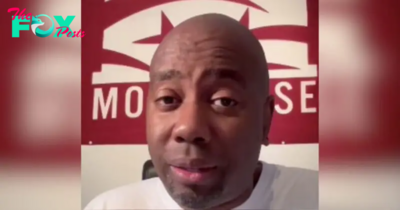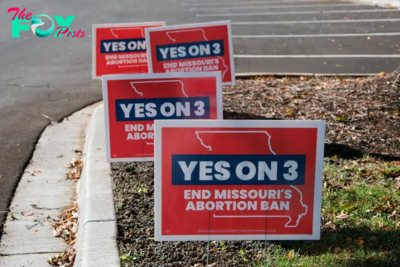Politics
‘Childless cat ladies’ is a political catchphrase that doesn’t match reality − Democrats and Republicans have similar demographics and experiences when it comes to parenthood
Republican vice presidential candidate JD Vance infamously said in 2021 that the Democratic Party is run by “a bunch of childless cat ladies who are miserable at their own lives and the choices they’ve made” – and do not have a “direct stake” in the future of the United States.
Three years later, after Vance’s selection as Trump’s vice presidential pick, these comments resurfaced and quickly became a cultural touchstone.
In July 2024, Vance clarified his controversial comments, saying that what he meant was that the Democratic Party has become anti-family and anti-child.
At a September 2024 campaign event alongside Donald Trump, Arkansas Gov. Sarah Huckabee Sanders echoed Vance’s sentiments about Democrats being anti-family. “My kids keep me humble. Unfortunately, Kamala Harris doesn’t have anything keeping her humble,” she said.
The single cat lady theme was amplified further when singer Taylor Swift used it to sign off on her Instagram endorsement of Harris.
While the cat lady framing is new, politicians making parenthood and family a centerpiece in their appeals to the American public has a long History.
As we show in our 2012 book, “The Politics of Parenthood,” and subsequent research, politicians have been using messages about parenthood as a way to appeal to voters since the 1980s.
Content analysis of party platforms and speeches by presidential candidates reveals that both parties have devoted more and more time and space to making the case that they are the true pro-family party. Republicans argue that lower taxes and smaller government strengthen American families, while Democrats argue that strengthening social welfare programs represents the best way to support families.
Despite the parties’ contrasting pro-family messages and the image conjured by Vance’s childless cat lady comments, Republicans and Democrats are not really that different when it comes to their actual experiences having and raising children.
Our analysis shows that the age at which Americans have children, how many children they have and whether parents work outside the home are surprisingly similar across partisan lines.

Democrats and Republicans find parenting rewarding
To explore whether there are differences between Republicans and Democrats in terms of their families, we analyzed data from the 2022 General Social Survey, which had 4,149 respondents. GSS is a nationally representative and well recognized survey of American adults that has been conducted since 1972. We also analyzed data from a 2022 Pew survey of 3,757 mothers and fathers focused on parenting in America.
This data shows that both Republicans and Democrats deeply value their roles as parents. In the Pew survey, 87% of parents said that their role as a parent is the most important or one of the most important aspects of their identity. Our analysis shows this is true for parents in both parties – 86% of Democrats and 88% of Republicans said they value their role as parents as the most or one of the most important aspects of their identity.
Similarly, our analysis of the Pew data reveals that Democrats and Republicans both enjoy being parents – 84% of Republicans say they find parenting enjoyable most or all of the time, compared with 81% of Democrats.
That said, contemporary parenting is also challenging.
The 2022 Pew survey showed that 29% of parents describe raising children as stressful most or all of the time. And 42% of parents report that raising children is tiring all or most of the time. Our analysis shows that this is equally true for Republicans and Democrats.
Indeed, the stresses of modern parenthood led the U.S. surgeon general in August 2024 to issue a public health advisory about parents’ declining mental well-being.
One of the reasons for this stress is that most parents today are balancing parenthood with work. The Republican Party has long embraced “traditional marriage,” meaning a marriage between a man and a woman, where the mother stays home to raise the children. Yet the reality is that most moms have jobs outside the home. In our analysis of the 2022 Pew data, we find that about the same portion of Republican moms – 67% – work outside the home as Democratic moms, who totaled 69%.
Both Republican and Democratic moms do more parenting
Another way that the experience of parenthood is similar across partisan lines is that moms spend more time parenting than dads. Pew asked parents with partners and spouses about the division of labor around a variety of child care tasks in 2022.
In our analysis of the full set of this data, which Pew provided us, we found that 77% of Democratic mothers and 80% of Republican mothers report doing more than their spouse or partner when it comes to managing their children’s activities. And 60% of Democratic mothers and 58% of Republican mothers report providing more comfort and emotional support to their children than their spouses or partners do.
This may account for why the Pew data reveals that mothers, more so than fathers, report parenting being tiring most or all of the time – 47% for moms, compared with 34% for dads. Once again, our analysis shows that mothers’ higher levels of fatigue hold true for both Republican and Democratic mothers compared with Republican and Democratic dads.
To assess the demographics of parenthood, we analyzed the 2022 General Social Survey data and found that Republicans and Democrats start their families at a similar age, just as they did a decade ago.
On average, male and female Democrats are 26 when they have their first kid, while Republicans are 25. Higher levels of education are associated with starting families later, but this is true for those in both parties.
Looking at women specifically, we find that Democratic women have their first child at 25 years old, and Republican women at 24. There is no evidence that Democratic women – more so than Republican women – are delaying having children so that they can pursue their careers, as suggested by Vance and Sanders in their critiques of the Democratic Party and Harris specifically.
It is true that Americans are having fewer children compared with a few decades ago. But this drop in having children is nearly universal in high-income democracies, even despite some government policies that seek to increase the birth rate in the U.S.
Our analysis reveals that the gap between Republicans and Democrats on this issue is modest. On average, Democrats are having 1.53 children, compared with 1.86 for Republicans.
And the 2022 General Social Survey data shows that Democrats do report having no children at a modestly higher rate than Republicans, but it is men – more than women – who report being childless at higher rates. Among Americans over 40, 22% of Democratic men and 16% of Republican men have no kids, compared with 17% of Democratic women and 10% of Republican women.
Despite political rhetoric suggesting there is a deep partisan divide among Americans on issues of families and child-rearing, the data tells a different story. It paints a picture of Americans, whether Democrats or Republicans, as remarkably similar in the basic demographics of parenting, as well as in their views about the joys and challenges of parenthood.
-

 Politics15h ago
Politics15h agoPolitical Scientist Dr. Ricky Jones: If Kamala Harris Won, Black People Would Have Another Excuse to Not Fight Back
-

 Politics19h ago
Politics19h agoAs He Staffs His Second-Term Administration, Trump Looks for Loyalty Above All
-

 Politics1d ago
Politics1d agoWhat to Know About Robert F. Kennedy Jr.’s Long History of Promoting Anti-Vaccine Views
-

 Politics1d ago
Politics1d ago‘Such Small Steps.’ States Without Citizen-Led Ballot Initiatives Leave Abortion-Rights Advocates With Little Recourse
-

 Politics1d ago
Politics1d agoWhat Trump’s Win Could Mean for Housing
-

 Politics1d ago
Politics1d ago‘Blacklash’ Over Kamala Harris Campaign Spending On Al Sharpton, Beyoncé, Megan Thee Stallion, And Other Celebs
-

 Politics1d ago
Politics1d agoMatt Gaetz Nomination Confirms Trump’s Revenge Talk Wasn’t Bluster
-

 Politics1d ago
Politics1d agoDon’t Give Trump Credit for the Success of the Biden Economy





















